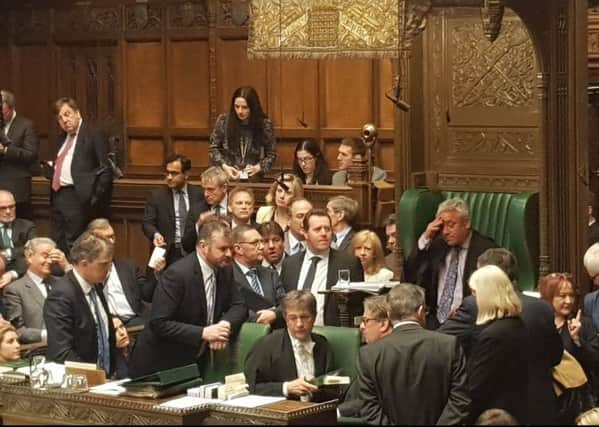William Wallace: This is why Parliament and democracy is creaking under the strain of Brexit


The two-party system, cherished by Churchill and generations of political leaders before him as providing strong government and effective opposition, is disintegrating. We have a government that can’t take decisions, an opposition that is incoherent, and an underlying confusion over the proper relationship between government, parliament and public.
{https://www.yorkshirepost.co.uk/news/opinion/tom-richmond-hospitals-are-the-effective-front-line-when-it-comes-to-brexit-and-our-mps-should-visit-them-for-a-reality-check-1-9690138|Tom Richmond: Hospitals are the real front line in the battle of Brexit
Advertisement
Hide AdAdvertisement
Hide AdBrexit is the immediate cause of this constitutional crisis. But it’s been brewing for many years. As in the USA, the two established parties, which used to represent different economic and social interests, no longer match the divisions within our society – now much more about values and identity.


Yet our antiquated voting system still holds them in place, leaving much of the voting public feeling unrepresented. The width of the gap between politicians and public was shown last week by an exchange in the Commons between two Old Etonian Conservative MPs, Jacob Rees-Mogg and Oliver Letwin, about the different Tudor and Stuart models of the relationship between king (or government) and parliament: obscure, more worthy of a boarding school debating society than Westminster.
If you think this is a remote issue for you, think how little leverage the north of England has over key issues of public spending, investment, education and social policy compared to the two million people of Northern Ireland, as represented by the Democratic Unionist Party.
Their 10 representatives are key to Theresa May’s survival, and have driven some hard bargains on extra funding for Ulster as well as on Brexit. But they don’t even represent the majority of voters in Ulster: our first-past-the-post electoral system has given them political dominance on a minority of votes.
Advertisement
Hide AdAdvertisement
Hide AdDevolution to Scotland and Wales has also given their representatives a louder voice in the national debate. The Scottish Nationalists, now the most disciplined and coherent party in Westminster, is highly effective in Parliament and on the media, alongside Conservative and Labour MPs who bitterly disagree with each other.
Yorkshire peers and MPs have their own cross-party parliamentary group, but no comparable ability to press their region’s interests on the Government. Our voting system could well give the SNP almost every seat in Scotland if an election were called this year, also on less than half the Scottish vote.
Some younger MPs have attempted to seize the initiative from their conflicted party leaders. Yvette Cooper and Hilary Benn have asserted parliamentary sovereignty against the Government; the Cooper-Letwin bill to prevent the Prime Minister from imposing a no-deal Brexit was rushed through the Commons on Wednesday, to face die-hard opposition from Conservative peers in the Lords yesterday.
One of the strongest signs of the constitutional confusion we have now sunk into is that Brexiters who campaigned to re-establish their vision of parliamentary sovereignty against the European Union are now calling for the Prime Minister to dissolve Parliament to stop MPs from taking control of its agenda.
Advertisement
Hide AdAdvertisement
Hide AdThe semi-federal system Britain has now developed for Scotland, Wales and Northern Ireland has left English politics unbalanced, most of all when the UK is governed by a Conservative Party largely drawn from the southern counties. The introduction of national referendums has deepened disagreements about the rules of our democratic politics.
Should popular sovereignty override parliamentary sovereignty on complex issues like Britain’s future political and economic relationship with other countries? Should parliament have the final say on the details of a deal, or should it be put back to ‘the people’?
There was, of course, a referendum on our voting system in 2011: defeated by a slick campaign led by Matthew Elliott, of the TaxPayers’ Alliance and later of Vote Leave, who used the same diversionary tactic of suggesting that more money could be spent on the NHS instead. We may need to return to that issue, as our political system crumbles further. A recent opinion poll showed that only a third of voters identify with the two established parties, both of which are close to splitting.
Over the last three years our government and political institutions have failed to clarify Britain’s place in the world, while neglecting the domestic priorities of regional inequality, educational needs, and health and social care for our ageing society. Those failures damage our interests, and weaken popular faith in democracy itself. The next Parliament must tackle them.